A blind eye to Britain’s arms exports
By Alex Stevenson
Insufficient attention to where British arms exports have ended up has been blamed by MPs for their use against civilians in conflict zones.
MPs’ calls for an end to this state of affairs follows a year in which parts for military hardware were used against civilians in the new year Gaza conflict and in the bloody climax to the Sri Lankan civil war.
The committee on arms export controls, which is made up of four influential Commons select committees, has demanded improved scrutiny of arms exports in its annual report out today.


And it has repeated its calls for the establishment of a register of permitted UK arms brokers and licences to be issued for all British arms dealers working abroad.
The government currently assesses exports to Israel and Sri Lanka on a case-by-case basis.
But the committee wants a review of all existing licences relating to Sri Lanka and a full assessment of which weapons used by the national army against the Tamil Tiger rebels were supplied by Britain.
“Sri Lanka highlights the need for the UK government to monitor closely the situation in countries recently engaged in armed conflict,” committee chairman Roger Berry said.
“It must assess more carefully the risk that UK arms exports might be used by those countries in the future in a way that breaches our licensing criteria.”
Today’s report highlights the extent to which the government has been prepared to allow apparent discrepancies to continue.
In 2002 London decided to authorise exports to the United States of components used in F-16 fighter aircraft and Apache helicopters, despite not authorising the export of the relevant parts or aircraft to Israel directly.
“The UK has a responsibility to ensure that its arms export industry, and individual UK citizens, working overseas are not engaging in the illegal arms trade and therefore we remain convinced that there is a need for a registration system for arms brokers,” Mr Berry added.
“In addition, the government must now work with NGOs and industry to bring forward draft proposals on extending the extra-territorial provisions of export control legislation.”
A Foreign Office spokesman said: “We welcome the committee on arms exports controls’ report on our state export controls.
“The government will respond in full to the committee’s conclusions and recommendations in due course.”









